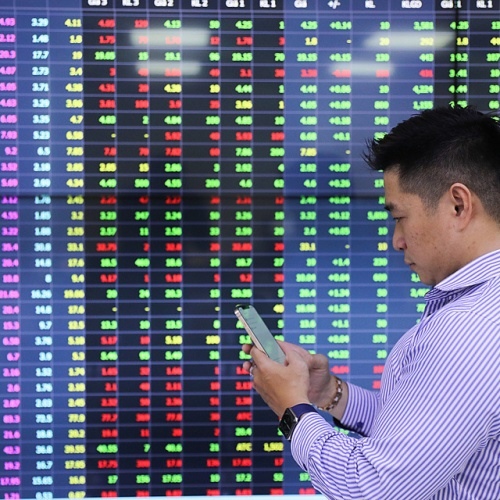|
Vn-Index towards 1,300 in 2024: SSI
This is expected to be a year of significant volatility, with a strong recovery possibly following deep correction.
The stock market’s benchmark Vn-Index is set to recover to around 1,300 in 2024, although there may be times when the market breaches this threshold.

Investor at a securities company in Hanoi. Photo: Viet Dung/The Hanoi Times
|
“Earnings growth will be the main driver helping equities to outperform this year. Additionally, in the context of record low-interest rates, high dividend yields also become an attractive factor,” noted SSI Research in its latest report.
According to the report, 2024 is expected to be a year of significant volatility, with a strong recovery, possibly following a deep correction.
SSI noted that the stock market is often influenced by both cash flow and fundamental factors.
Regarding fundamental factors that may affect the market, analysts from SSI Research emphasize that 2023 was a year with many measures to "buy time" for the real estate and finance markets to return to normal. Therefore, a recovery is expected to help the financial system avoid major challenges in 2024.
From SSI's perspective, the economic recovery will likely be more pronounced in the second half of 2024, with exports increasing due to global interest rate cuts and consumer confidence gradually returning. Domestically, the main focus will remain on the real estate sector's recovery, as real estate enterprises need to quickly resolve project legal issues, and the real estate lending rate remains high.
“If liquidity in the real estate and corporate bond markets does not recover quickly, consumer confidence will be affected,” noted the SSI.
In 2023, key highlights for the real estate sector include the relatively slow resolution of legal issues of existing real estate projects and the passage of some important new regulations (Land Law, Housing Law, and Property Law) by the National Assembly aimed at strengthening buyer protection and market integrity.
In 2024, if the legal issues of existing projects are not resolved promptly, SSI Research forecasts a strong increase in M&A activity focused on projects with sufficient legal standing. Consequently, the estimated supply could improve positively from the low base in 2023.
In addition, market liquidity continues to improve for the mid-market segment in major cities, where there is a large supply shortage, although the rate of improvement may slow due to high sales prices. On the other hand, resort real estate may continue to face many challenges.
In principle, capital raised from the sale of projects with sufficient legal standing could help real estate companies buy more time until legal issues for stalled projects are resolved.
"We expect the recovery in the real estate market to be differentiated across segments and to take more time to recover fully. Only real estate companies with strong financial health will be able to overcome the challenges in 2024," it noted. SSI Research, which is closely tied to the real estate sector, forecasts that banks' non-performing loan ratios could peak in Q3/2024 before declining in the base scenario.
In this regard, the prospects for the real estate and banking sectors may not be favorable in 2024. The expected recovery process is gradual, not to mention several closely watched factors, including the property tax bill currently being developed by the Ministry of Finance, which will significantly impact real estate demand. Other fundamental aspects to be closely monitored include the geopolitical situation worldwide and domestic policies to support economic recovery.
Cheap capital to serve as driving force
In terms of cash flow, record-low interest rates will be the primary growth driver, especially for individual investors. Bank deposits continue to increase as other investment channels are relatively limited. For the time being, gold prices have risen significantly while the real estate and corporate bond sectors require more time to recover.
"This capital flow may return to the stock market at different times in 2024. As retail investors accounted for up to 92.2% of the average daily trading volume of the entire market in 2023, the VN-Index is expected to experience significant jumps in 2024 thanks to this capital flow," SSI's analysis predicts.
Meanwhile, foreign capital flows are not expected to pick up immediately, but at least the selling pressure is no longer as strong as last year. Foreign investors experienced net selling in 2023, but the brokerage expects this trend to reverse in 2024 following the Fed's gradual interest rate cuts and the opportunity of the Vietnamese stock market being upgraded by FTSE Russell in 2024-2025.
“The market upgrade to emerging market status is an event that investors have long awaited,” it noted.
According to SSI Research's calculations, although the growth in 2024 is not expected to be overly strong, some sectors may experience significant recovery with post-tax profit growth of over 30%, including steel, retail, and prominent securities compared to other sectors. Other industry groups are also viewed positively by the company, such as the information technology and industrial real estate sectors, based on their long-term growth potential.
"Both retail and foreign investor capital flows are favorable for the stock market this year, while the fundamental foundation still has concerns about some of the aforementioned factors. 2024 is expected to be a year of significant volatility, with a strong recovery possibly following a deep correction. We recommend buying when the market goes through significant corrections," the report concluded.
| The Vietnamese stock market concluded a relatively successful year in 2023. As of December 29, 2023, the VN-Index recorded a 12.2% increase compared to the end of 2022 at 1,224 and recovered by 23.9% from the mid-term low in mid-November 2022, although it remained 26.1% below the peak established in April 2022. The total market capitalization reached nearly VND6,000 trillion (US$245 billion), an increase of 13.5% compared to the end of 2022. The capitalization/GDP ratio also rose to 58.4% from 55.4%. |
Hanoi Times
|